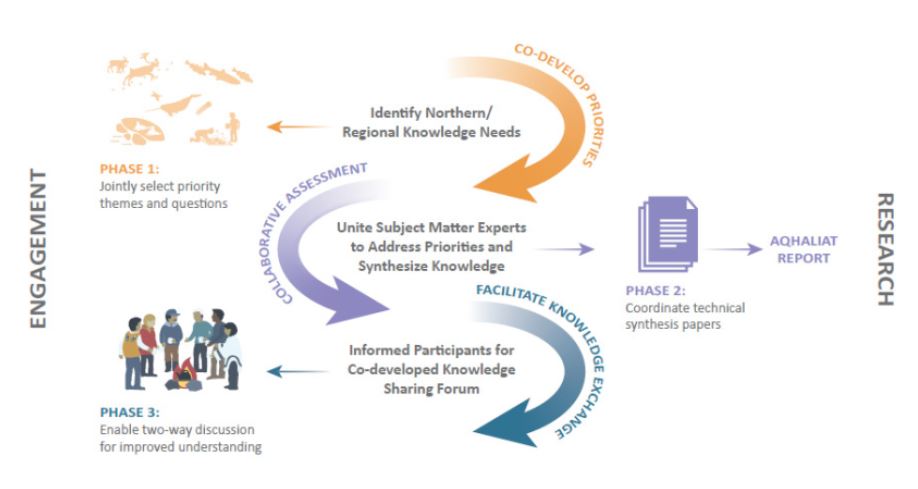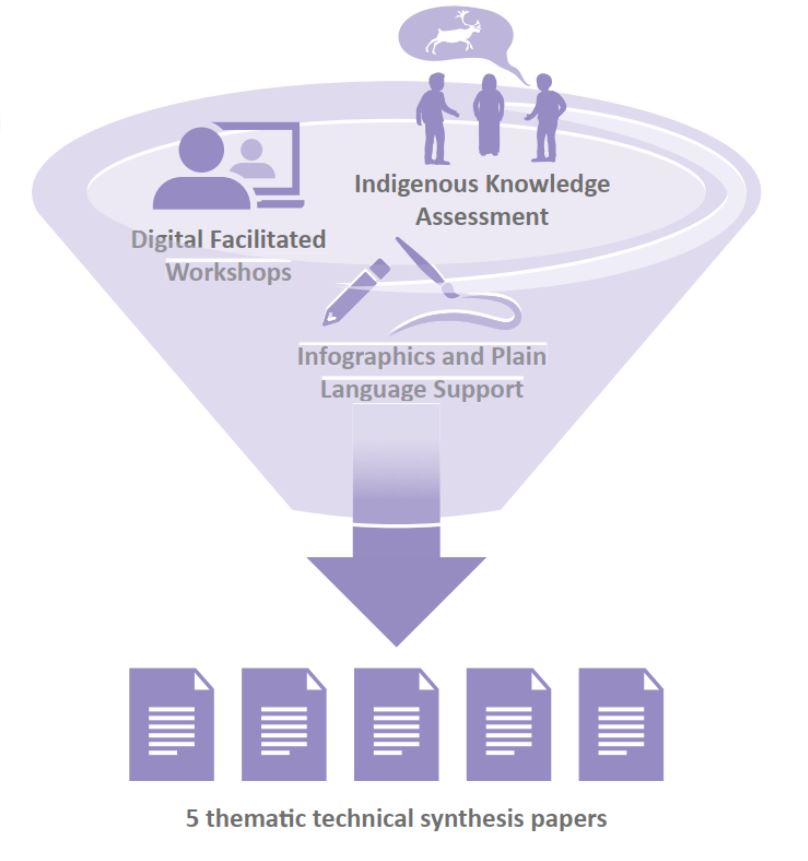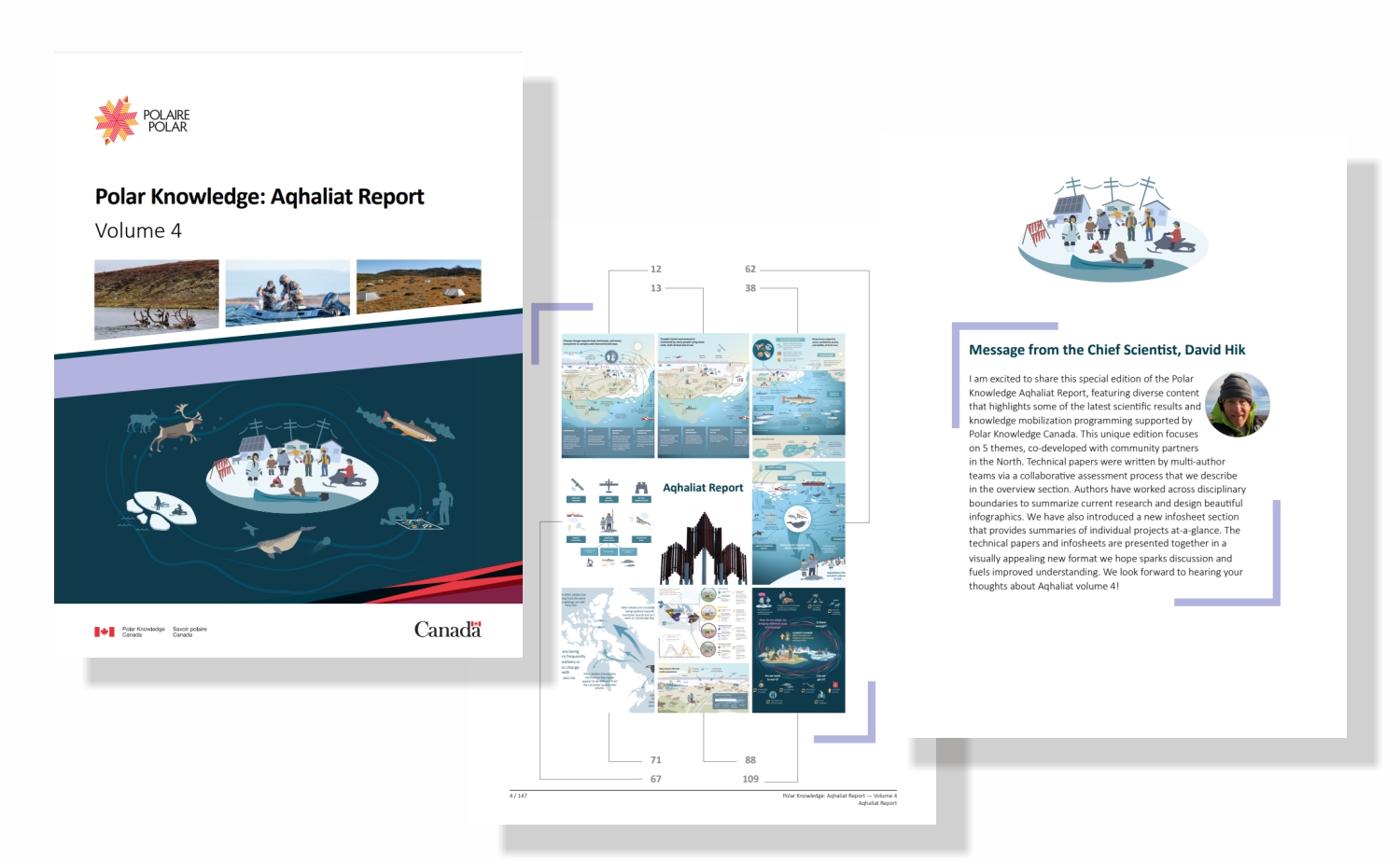Polar Knowledge Canada (POLAR) recently published its latest volume of the Aqhaliat Report—an open-access, online publication unveiling the latest findings from POLAR and its global collaborators. This annual report, volume 4, showcases scientific and technological breakthroughs, decision-supporting projects, and impactful outreach initiatives from the past year.
Executive Summary
There are many impacts observed across the Canadian North because of changing environmental conditions. Increasing heat in the atmosphere caused by human pollution is causing the Arctic to warm up faster than anywhere else on Earth, and more frequent and intense weather has been occurring across the North. More unpredictable weather, tundra fires, forceful winds and storminess is expected to occur, with important impacts on northern communities. Air temperature controls all aspects of Arctic life, including which animals and plants can survive, when rivers and oceans freeze and break up, and the thickness of sea ice and permafrost. Canadian Arctic communities are warming the most in winter. Rainfall changes affect caribou and muskoxen, as they must break ice to get to their food. The snow season is shorter. Permafrost is warming and thawing. Arctic plants are changing in complex ways, in some area's climate change is causing them to grow more, shrubs becoming denser, and more grasses are present. Eventually, the tree line will move Northward. Ocean water is changing with increasing freshwater and sediments from melt, and this affects ocean life from microscopic species to fish and marine mammals. Global sea level rise will be less significant in the Canadian Arctic compered to low-laying islands elsewhere in the world. Arctic Sea Ice is melting, and this affects the safety of ice travel.
There still is much to learn about the effects of climate change to the environment in the Canadian Arctic. Key indicators such as rain, temperature, vegetation change and more can be observed, measured and monitored. More monitoring, both local and regional, is needed so that these indicators can tell us about the environment and how it is changing over time. Monitoring will provide information to help improve our understanding of the key indicators, so that we can give more complete answers to questions about regional concerns. Natural scientists need to work with Indigenous Knowledge holders to better understand these key indicators.
To better understand the environmental effects of climate change and to build linkages between Indigenous Knowledge and Science, the Working Group came up with the following list of six Emerging Opportunities:
1. Develop research partnerships with northern communities that focus on community-based research needs; include knowledge sharing and knowledge co-production for all aspects of environmental change research in the region.
2. Develop a new set of environmental indicators with Indigenous rights holders. These would include indicators developed by Indigenous Knowledge holders and scientists and would be included in the research design. The indicators could be adapted for regional and local needs.
3. Establish Community-Based Monitoring initiatives with long-term support that builds capacity in the community and enables the collection of consistent, continuous, and high-quality observations of key environmental indicators.
4. Create opportunities for Inuit youth to participate in monitoring programs and use research tools and educational resources to develop their own youth-led projects.
5. Develop models that predict how climate change will affect each community, to help them adapt.
6. Develop tools for two-way exchange of information that are available to the public and simple to use.
Message from the Chief Scientist, David Hik.
I am excited to share this special edition of the Polar Knowledge Aqhaliat Report, featuring diverse content that highlights some of the latest scientific results and knowledge mobilization programming supported by Polar Knowledge Canada. This unique edition focuses on 5 themes, co-developed with community partners in the North. Technical papers were written by multi-author teams via a collaborative assessment process that we describe in the overview section. Authors have worked across disciplinary boundaries to summarize current research and design beautiful infographics. We have also introduced a new infosheet section that provides summaries of individual projects at-a-glance. The technical papers and infosheets are presented together in a visually appealing new format we hope sparks discussion and fuels improved understanding. We look forward to hearing your thoughts about Aqhaliat volume 4!
Report Table of contents:
- Methods of the collaborative assessment
- Environmental change in the Kitikmeot Region of western Nunavut and Ulukhaktok region of eastern Northwest Territories
- Arctic char in a rapidly changing North
- Marine mammals in a changing Arctic Ocean
- Caribou – heartbeat of the tundra
- Understanding the effects of climate change on food security in northern Indigenous communities
- Infosheets
- Infographics of the collaborative assessment
Methods of the collaborative assessment
Polar Knowledge Canada (POLAR) is mandated to strengthen Canada's leadership on Arctic issues and advance knowledge of the Canadian Arctic. Through leadership, partnerships and collaboration on polar science and technology, one of the federal agency's major functions is to create and synthesize knowledge and share information for decision making, for the benefit of northern communities and all Canadians. In March 2020, POLAR hosted a Regional Planning and Knowledge Sharing Workshop at the Canadian High Arctic Research Station (CHARS) campus in Cambridge Bay, Nunavut, Canada. The workshop focused on perspectives of Indigenous knowledge holders, knowledge producers and knowledge users in Nunavut and the Northwest Territories to identify key thematic sessions of relevance to communities, while establishing guidelines for communicating and sharing knowledge within a northern context.

- Caribou population abundance and migration;
- Arctic char and other fish population dynamics;
- Whale populations and marine ecosystem biodiversity;
- Climate change research and monitoring;
- Environmental change – snow, ice, precipitation.

The collaborative assessment ran parallel to an Indigenous Knowledge (IK) assessment. This assessment ensured that Indigenous Knowledge holders were provided the full opportunity to participate in sharing knowledge on the five themes and that IK will be represented in final technical paper submission. This was facilitated by Ajungi Arctic Consulting Group. Despite the short timeframe to recruit, a good selection from across the North, of different ages, genders and professions participated and shared their knowledge in the workshops. Two members of each working group were able to observe the workshop and given an opportunity at the end of the session to ask questions for clarification or additional information. Summary reports were developed from the workshops and sent to IK assessment participants to review for accuracy. These summaries were integrated into each thematic report into an Indigenous Knowledge section. The workshops were deemed a success by those who participated.
To learn more about Polar Knowledge Canada and read the full report
About the Polar Knowledge: Aqhaliat Report
Polar Knowledge: Aqhaliat Report is an online, open-access report published annually by Polar Knowledge Canada (POLAR). It disseminates and promotes awareness of new knowledge generated by POLAR and its Canadian and international partners over the previous year. Polar Knowledge: Aqhaliat Report presents results from the following:
- Scientific and technological research led or supported by POLAR;
- projects that mobilize research results to support decision-making; and
- outreach, engagement, and capacity-building efforts related to research
The word aqhaliat is the Inuinnaqtun term for the northern lights, i.e. aurora, which are an important cultural symbol connecting Indigenous peoples throughout the circumpolar regions. Auroras occur at both poles, encompassing the Arctic and Antarctic bearings of POLAR’s mandate.
Source: Government of Canada
The tags below provide an opportunity to view previously posted related news within the selected category

